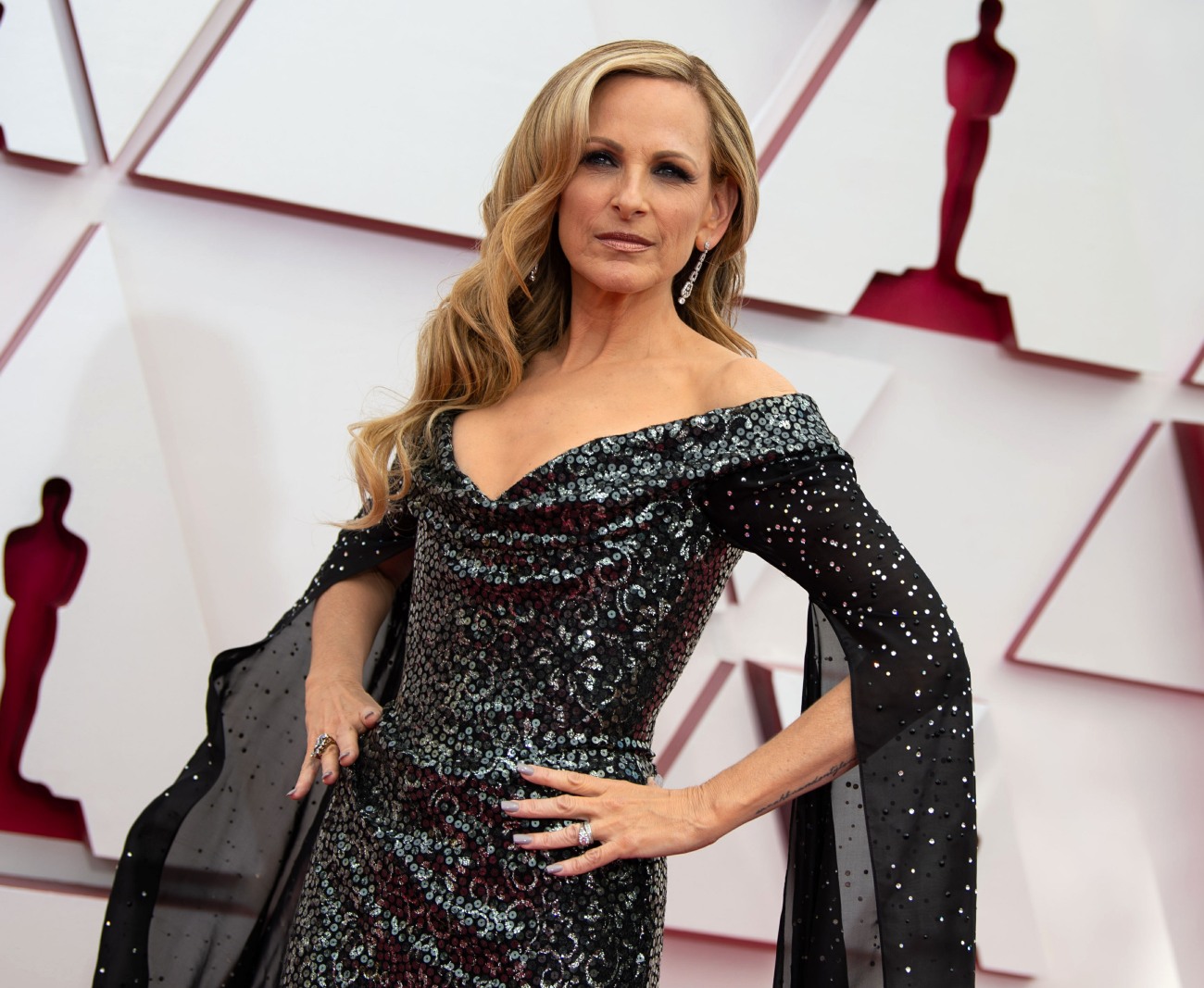Marlee Matlin has a new interview with the Daily Beast to promote CODA, a film about deaf parents and their hearing child. That’s what the acronym stands for: Child of Deaf Adults. CODA went to Sundance this year and it was a huge hit, and Apple bought it for $25 million. People are pretty convinced that Marlee will probably get nominated for another Oscar, and that the film will likely get nominated for a lot of awards too. Marlee spoke to the Daily Beast about the film, about William Hurt and Donald Trump and a lot more. Some highlights:
On CODA: “I hope that people will approach the film with an open mind. Don’t think of it as ‘a film for deaf people.’ It’s about a different language, just like you would watch any movie with subtitles, and it comes with a rich history and a beauty that you can’t ignore. At the end of the day, it’s one of thousands of stories in our community that we want to share with people.”
Originally, filmmakers were going to use hearing actors to play deaf characters: ”The idea was presented to me that there would be hearing people who would be playing those roles, and I thought, are you kidding me? I didn’t have to freak out and I didn’t have to go crazy and scream about it, I just calmly said, “If you do it, then I am out.” Simple as that. And I guess my feelings—and what I was trying to represent—worked. I mean, it was a no-brainer.
Hollywood is historically very ableist. “There’s still a lot of ableism and a lot of work to do in Hollywood—especially in terms of deaf and disabled communities being represented, even in terms of casting. Nowadays, “diversity” is the buzzword. We’re seeing it every day, from every corner of the business, and rightfully so. But it seems, when they’re talking about diversity, to not remember that the deaf and disabled communities are part of the conversation. For as long as I’ve been in the business, 35 years, I’ve talked about how diversity should include deaf and disabled actors, and I’ve had so many conversations about this. People come and go in this entertainment industry—the ones who run the studios, who have the power, who green-light films—and not everyone who comes onboard agrees with everyone else. Now, we’re experiencing a generational difference with people who have more progressive opinions, but when it comes to this particular topic, the same thing keeps happening.
Winning the Oscar for Children of a Lesser God: “You know, it’s funny—I had nothing to compare it to when I got the award. There were no deaf nominees before me, so there was no blueprint to follow. I understood the enormity of it when it happened, and it was nice to be in the history books in that way, but it was a really tough time for me. Listen, I got nominated when I was in rehab. And I was busy and focused on taking care of myself. Then I win an Oscar, and it all happened so fast. So then I thought, OK, what am I going to do about work? I got to work in a film with Ed Harris [Walker] right after winning the Oscar, then I moved out to California and I lived with the Winklers [Henry and Stacey]. They invited me out for the weekend to think about my career prospects, and two days turned into two years living with the Winkler family. They said, “Clean your room, Marlee, it’s been two years!”
On William Hurt’s emotional abuse during their relationship: “I’m smiling right now, because if that happened right now, things would have turned out much differently. I would have slugged him. [Laughs] Yeah, I was very young, as you said. I sat in the limousine, took off my shoes, and was like, “Holy sh-t! How did this happen? I’ve got an Oscar!” and I’m looking at him, wondering what he’s thinking. And he goes, “So many talented actors have worked so hard to get this award you just got. What makes you think you deserved it?” I’m loud and I talk a lot, but I could not say a word when he made that comment. And you know what? I understand very clearly now that that was an oppressive relationship, but at the time, I just didn’t know what to say. All I can say is, that would never happen to me today. Never.
On William Hurt’s physical & sexual abuse: “I think it’s because it happened so long ago—it was way back when—and I’m not going to excuse his behavior nor am I going to judge his behavior. It’s something that’s with me and stays with me, and I think about it from time to time—I do—and sometimes I get PTSD from it, but I’ve grown up, and I’ve learned, and I know how important it is to stand up for yourself, and I’ve passed along that message to my daughter. I know what happened. I can’t change what happened, but I can hopefully change my own attitude about it and my experience and move on with my life. And I’m there for anybody who’s gone through similar circumstances. I’m right there if a friend is in a similar position, because I’ve been there.
When Donald Trump allegedly called her the r-word when she did Celebrity Apprentice: “In all honesty, I was surprised. I still say to this day allegedly, because there were five or six crew members who confirmed to me that he wrote out, “Is she retarded?” But if that were true, I only knew him casually throughout the years and he was nothing but nice to me to my face. I never had an opportunity to sit down and talk to him, so I was surprised. Maybe I was ignorant and didn’t know. But he never in person spoke down to me. He responded to what I said by saying, “I never said that to that woman,” and he never expanded, so I don’t know what that means. Maybe he did say it and just wanted to refute it. But I didn’t want to waste too much of my energy on it other than to say, it’s not something you should say about anybody. And I just moved on.
She’s a lot kinder and more evolved about William Hurt than I could ever be. It’s not even that we only learned about Hurt’s abusive nature when she wrote her memoir either – people knew that sh-t at the time, that he was treating her like crap, that he was emotionally abusive. People found out a lot more when she wrote her memoir and I guess that she feels like, hey, there’s nothing else to do now but tell the truth. The most surprising part of this interview was finding out how close she is to Henry Winkler and his wife. She describes him as a second father, she got married at his house (because he insisted on it) and she lived at the Winkler house on-and-off throughout her 20s, it sounds like. What a mensch!! I love stories like that, when you find out someone is actually a really lovely person who mentors and helps people and treats everyone like family.
Anyway, can’t wait to see CODA.
Photos courtesy of Avalon Red.














Love you all
I watched Coda a while back – while it’s a good movie, I didn’t find it Oscar caliber. Out of everyone in the cast this movie belongs to Emilia Jones 100% and she should be recognized for it. Troy Kotsur also does a fantastic job. Marlee was fine, just not nomination worthy.
I watched CODA last night and it’s a lovely movie and the dynamics of the movie are relatable and eye opening to see how a family of deaf parents live. I saw Marlee on CBS Sunday Morning and she told the story of how she lived with the Winklers for 2 years and how special and lovely they are. She is a dynamic woman with so much talent! As for the relationship she had with William, you are right. Everyone knew what an egotistical POS he has been all these years and he has gotten away with it, since the ‘80’s. I am thankful she survived him and her habit.
Matlin is one of those actors who, every time she shows up in something, I always think “oh, I love her!” I haven’t seen this yet, looking forward to it.
Same here. I’d love to see her and Millicent Simmonds, the excellent young actress from A Quiet Place and AQP II, in a movie together.
That trailer really makes me want to watch this. Argh, I need to book a week off and do a free trial of apple tv and work through everything on my list as I’m not adding yet another subscription to what we already have.
She was in West Wing in a recurring role and was amazing! I think she’s headturning beautiful w/twinkling eyes ( if that makes sense ) and I’ve always hated Hurt who has serial killer eyes
I was going to comment on her role on the WW so I’m glad I saw your comment first. She was so good in that role. And part of my favorite ep, Take This Sabbath Day.
I happily saw CODA at a recent screening for the San Francisco Film Society, honoring the director Siân Heder. This film is a GEM.
The mythical low/mid budget arthouse film, written and directed by a woman, featuring a female hero story, and a fantastic cast with authentic deaf representation. That in and of itself is incredible to say the least.
There is a terrific moment early on, when I happily relaxed into the experience as I realized that this is not a typical hollywood film with ham-handed overplayed emotional moments with jarring and false note dialogue to ensure you get the point and all the feels. CODA does not let you down. From the doctor’s office scene you wonderfully get to let go and allow yourself to thoroughly enjoy the film. Though there are some rote scenes (the token high school embarrassment), they are far removed from the typical angsty teen film – they ring true as opposed to often wondering if the writer had actually attended a real life high school. And the romance really does give you the feels, but in an adorable and very romantic journey.
Read the Hollywood Reporter and Daily Beast articles and realized how much care, warmth and emotional investment went into the crafting of this film – proactively invited and championed by Siân Heder and with the linchpin casting of Marlee Matlin. They were able to see the long vision all the way through, and create an immensely collaborative experience in crafting the verbal and ASL dialog, and the nuances of sound and scene blocking. Siân Heder as a writer and director is no doubt here to stay, and I eagerly look forward to the further immersive and engaging stories she will share with us.
The movie is a remake of the french film La Famille Bélier.
I really adore this actress yet never knew this about her personal life with William Hurt. I can’t believe I’ve been enjoying that man’s acting for years and didn’t realize he was an abuser of at least one woman who I admire. So disappointing in Hurt, so happy that Matlin is not that young woman anymore. Perhaps it’s why I didn’t know because she’s always appeared the type to check anyone, anytime, anywhere.
CODA is a great little movie. Emilia Jones put a lot of heart into the role. Marlin role though is not Oscar worthy or at least huge like that. I actually like the father more than her. Still catch the movie if you can. As for Hurt, wow just hearing about this. What a piece of garbage. Hollywood always chooses the losers to protect.